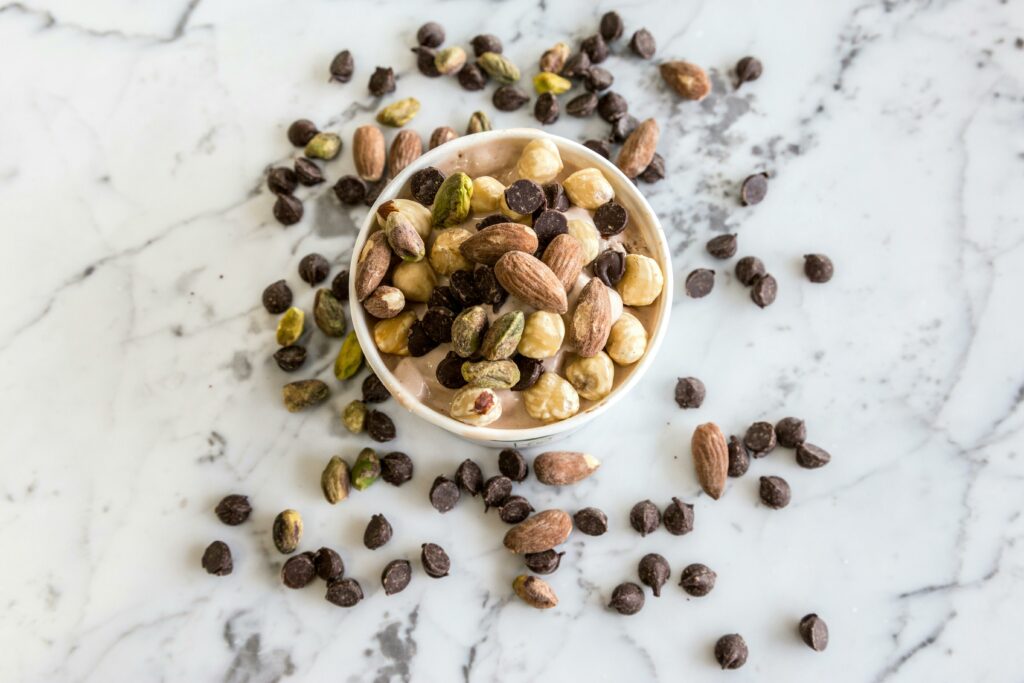How to Reduce Inflammation One Meal at a Time
Are you tired of feeling sluggish, achy, and weighed down by inflammation? Many of us in our middle years are facing the challenges of maintaining a healthy diet, fighting off extra pounds, or battling chronic disease. But here is a well-researched resource to help you take control of your health and reduce inflammation one meal at a time.
Inflammation is your body’s natural response to injury or infection, and it plays a crucial role in healing. However, when inflammation becomes chronic, it can lead to a host of health issues, including heart disease, diabetes, and arthritis. The good news is that you can reduce inflammation through simple dietary changes and lifestyle habits.
If you’re thinking, “I don’t have time to plan elaborate meals or follow complicated diets.” I hear you. That’s why I’m sharing these simple, practical ways to reduce inflammation through your diet without sacrificing flavor or convenience. If you want to wake up feeling refreshed and energized, ready to tackle the day, keep reading.
In this article, you will find the best advice on anti-inflammatory eating, drawn from research and best practice. I’ll provide you with easy-to-follow tips and strategies to help you make healthier choices and reduce inflammation one meal at a time. So, let’s see how you can take control of your health and well-being starting today.

Contents Summary:
- Common Inflammatory-Causing Foods
- List of foods known to contribute to inflammation, such as refined sugars, processed meats, and trans fats.
- Explanation of how these foods can trigger inflammatory responses in the body.
- The Role of Inflammation in Disease
- Discussion of how chronic inflammation is linked to various diseases, including heart disease, diabetes, and arthritis.
- Emphasis on the importance of reducing inflammation to improve overall health.
- Benefits of an Anti-Inflammatory Diet
- Explanation of how an anti-inflammatory diet can help reduce inflammation and lower the risk of chronic diseases.
- Discussion of the potential benefits, such as improved digestion, increased energy, and weight management.
- Anti-Inflammatory Foods to Include in Your Diet
- List of foods known to reduce inflammation, such as fatty fish, leafy greens, and berries.
- Explanation of how these foods can help combat inflammation and promote overall health.
- Cooking Methods to Reduce Inflammation
- Explanation of how certain cooking methods, such as steaming, baking, and grilling, can help preserve the anti-inflammatory properties of foods.
- Tips on how to cook meals in a way that reduces inflammation and maximizes nutritional benefits.
- The Impact of Processed Foods on Inflammation
- Discussion of how processed foods, high in refined sugars and unhealthy fats, can contribute to inflammation.
- Tips on how to reduce the consumption of processed foods and opt for whole, nutrient-dense foods instead.
- Incorporating Anti-Inflammatory Foods into Your Meals
- Practical tips on how to incorporate anti-inflammatory foods into your daily diet, such as adding berries to oatmeal or using olive oil in cooking.
- Sample meal plan ideas to help readers get started on an anti-inflammatory diet.
Common Inflammatory-Causing Foods
Certain foods are known to trigger inflammation in the body. These include refined sugars, processed meats, and trans fats. These foods can lead to increased levels of inflammatory markers in the blood, which can contribute to chronic inflammation over time.By understanding which foods to avoid or limit, you can help reduce inflammation in your body. Here are some common inflammatory-causing foods:
- Refined Sugars: Foods high in refined sugars, such as sugary drinks, pastries, and candies, can lead to inflammation. When you consume these foods, they cause a spike in your blood sugar levels, which can trigger an inflammatory response in the body.
- Processed Meats: Processed meats like bacon, sausage, and hot dogs are high in unhealthy fats and additives, which can contribute to inflammation. These meats are often high in saturated fats and trans fats, which have been linked to increased levels of inflammatory markers in the body.
- Trans Fats: Trans fats are found in many processed and fried foods, as well as margarine and shortening. These fats can increase inflammation in the body and have been linked to an increased risk of heart disease and other chronic conditions.
- Vegetable Oils: Certain vegetable oils, such as corn, soybean, and canola oil, are high in omega-6 fatty acids, which can promote inflammation when consumed in excess. It’s important to balance your intake of omega-6 and omega-3 fatty acids for optimal health.
How These Foods Trigger Inflammatory Responses
These foods can trigger inflammation in a few different ways. For example, refined sugars can lead to an increase in inflammatory markers in the body, while processed meats and trans fats can promote inflammation through their impact on cholesterol levels and the gut microbiome.
Additionally, these foods are often low in nutrients and high in calories, which can contribute to weight gain and obesity. Excess body fat, especially around the abdomen, is known to promote inflammation in the body.
By limiting your intake of these inflammatory-causing foods and focusing on a diet rich in whole, nutrient-dense foods, you can help reduce inflammation in your body and improve your overall health.
The Role of Inflammation in Disease
Chronic inflammation plays a significant role in the development of various diseases, including heart disease, diabetes, and arthritis. Research has shown that chronic inflammation can contribute to the progression of these conditions and may even be a key factor in their development.
- Heart Disease: Chronic inflammation has been linked to the development of atherosclerosis, a condition characterized by the buildup of plaque in the arteries. This plaque can restrict blood flow to the heart, increasing the risk of heart attack and stroke. Studies have found that inflammatory markers, such as C-reactive protein (CRP), are associated with an increased risk of heart disease.
- Diabetes: Inflammation is believed to play a role in the development of insulin resistance, a key factor in type 2 diabetes. Research suggests that chronic inflammation can impair the function of insulin-producing cells in the pancreas and interfere with the body’s ability to regulate blood sugar levels. Studies further show that inflammatory markers are elevated in individuals with type 2 diabetes.
- Arthritis: Chronic inflammation is a hallmark feature of arthritis, including rheumatoid arthritis and osteoarthritis. In these conditions, inflammation leads to joint pain, stiffness, and swelling. Research has shown that inflammatory markers are elevated in individuals with arthritis and that reducing inflammation can help improve symptoms.
Reducing Inflammation to Improve Overall Health
Given the role of inflammation in the development of these and other diseases, reducing inflammation is crucial for improving overall health. Fortunately, there are several ways to reduce inflammation through lifestyle and dietary changes.
- Diet: A diet rich in anti-inflammatory foods, such as fruits, vegetables, whole grains, and healthy fats, can help reduce inflammation in the body. Studies have shown that following an anti-inflammatory diet can lead to a decrease in inflammatory markers and a reduced risk of chronic disease.
- Exercise: Regular physical activity has been shown to have anti-inflammatory effects. Exercise can help reduce inflammation in the body and improve overall health. Studies have found that both aerobic and resistance exercise can lower inflammatory markers in the body.
- Stress Management: Chronic stress can contribute to inflammation in the body. Stress management techniques, such as meditation, yoga, and deep breathing exercises, can help reduce inflammation and improve overall health.
- Weight Management: Excess body fat, especially around the abdomen, can promote inflammation in the body. Maintaining a healthy weight through diet and exercise can help reduce inflammation and lower the risk of chronic disease.
By taking steps to reduce inflammation through lifestyle and dietary changes, you can improve your health and lower the risk of developing chronic diseases associated with inflammation.
Benefits of an Anti-Inflammatory Diet
An anti-inflammatory diet is rich in foods that help reduce inflammation in the body. By focusing on whole, nutrient-dense foods and avoiding inflammatory triggers, you can help your body heal and prevent chronic inflammation. Here are some of the key benefits of following an anti-inflammatory diet:
- Reduced Inflammation: One of the primary benefits of an anti-inflammatory diet is reduced inflammation in the body. Studies have shown that following an anti-inflammatory diet can lead to a decrease in inflammatory markers, such as CRP, TNF-alpha, and interleukin-6.
- Lower Risk of Chronic Diseases: Chronic inflammation is linked to a variety of chronic diseases, including heart disease, diabetes, and cancer. By reducing inflammation through diet, you can lower your risk of developing these and other chronic conditions. Research has shown that following an anti-inflammatory diet is associated with a reduced risk of heart disease, diabetes, and certain types of cancer.
- Improved Digestion: An anti-inflammatory diet is typically high in fiber, which can help improve digestion and promote a healthy gut microbiome. A healthy gut microbiome is important for overall health and can help reduce inflammation in the body.
- Increased Energy: Following an anti-inflammatory diet can help stabilize blood sugar levels and prevent energy crashes. By focusing on whole, nutrient-dense foods, you can maintain steady energy levels throughout the day.
- Weight Management: An anti-inflammatory diet can also help with weight management. By focusing on whole, nutrient-dense foods, you can feel satisfied and full, reducing the likelihood of overeating. Additionally, some foods in an anti-inflammatory diet, such as green tea and chili peppers, have been shown to boost metabolism and promote weight loss.
Anti-inflammatory diets have a range of benefits for your health, from reducing inflammation and lowering the risk of chronic diseases to improving digestion, increasing energy, and helping weight management. By incorporating anti-inflammatory foods into your diet, you can help your body heal and thrive.
Anti-Inflammatory Foods to Include in Your Diet
Including anti-inflammatory foods in your diet can help boost your metabolism and promote healthy digestion. These foods are rich in antioxidants, vitamins, and minerals that help combat inflammation and support your body’s natural healing processes. Here are some key anti-inflammatory foods to include in your diet:

Fatty Fish: Fatty fish such as salmon, mackerel, and sardines are rich in omega-3 fatty acids, which have been shown to reduce inflammation in the body. Omega-3 fatty acids are essential fats that the body cannot produce on its own, so it’s important to get them from your diet.
Leafy Greens: Leafy greens such as spinach, kale, and collard greens are packed with vitamins, minerals, and antioxidants that help reduce inflammation. These greens are also high in fiber, which can help support a healthy gut microbiome and reduce inflammation in the body.
Berries: Berries such as blueberries, strawberries, and raspberries are rich in antioxidants called flavonoids, which have been shown to reduce inflammation. These fruits are also high in fiber, which can help reduce inflammation and support overall health.
Nuts and Seeds: Nuts and seeds, such as almonds, walnuts, and chia seeds, are rich in healthy fats, antioxidants, and fiber, all of which can help reduce inflammation. These foods are also a good source of protein, which is important for muscle repair and overall health.
Turmeric: Turmeric is a spice that contains a compound called curcumin, which has powerful anti-inflammatory properties. Adding turmeric to your diet can help reduce inflammation and support overall health.
Olive Oil: Olive oil is rich in monounsaturated fats and antioxidants, which can help reduce inflammation in the body. It’s a healthier alternative to other cooking oils and can be used in cooking or as a salad dressing.
Green Tea: Green tea is rich in antioxidants called catechins, which have been shown to reduce inflammation and improve overall health. Drinking green tea regularly can help reduce inflammation and support your body’s natural healing processes.
Including these anti-inflammatory foods in your diet can help reduce inflammation in the body and promote overall health. Try incorporating a variety of these foods into your meals to reap their benefits and support your body’s natural healing processes.
Cooking Methods to Reduce Inflammation
The way you cook your food can affect its inflammatory properties. Certain cooking methods can help preserve the anti-inflammatory properties of foods, while others can increase inflammation. Here are some cooking methods that can help reduce inflammation:
- Steaming: Steaming is a gentle cooking method that helps retain the nutrients and anti-inflammatory properties of foods. Steaming vegetables, fish, or poultry can help preserve their health benefits and reduce the risk of inflammation.
- Baking: Baking is another gentle cooking method that can help retain the nutrients and antioxidants in foods. Baking vegetables, fruits, or whole grains can help preserve their anti-inflammatory properties and promote overall health.
- Grilling: Grilling is a healthy cooking method that can add flavor to foods without adding extra fat. Grilling vegetables, fish, or poultry can help preserve their anti-inflammatory properties and reduce the risk of inflammation.
- Stir-frying: Stir-frying is a quick cooking method that can help retain the nutrients and antioxidants in foods. Using a small amount of healthy oil, such as olive or avocado oil, can help reduce inflammation and promote overall health.
- Avoiding deep-frying: Deep-frying foods can increase their inflammatory properties by adding unhealthy fats and calories. It’s best to avoid deep-frying and opt for healthier cooking methods instead.
Tips for reducing inflammation through cooking:
- Use healthy oils: Choose oils high in monounsaturated fats, such as olive or avocado oil, which have anti-inflammatory properties.
- Use herbs and spices: Herbs and spices like turmeric, ginger, garlic, and cinnamon have natural anti-inflammatory properties and can be used to flavor your food.
- Eat a variety of foods: Incorporate a variety of colorful fruits, vegetables, whole grains, and lean proteins into your diet to ensure you’re getting a range of anti-inflammatory nutrients.
- Limit processed foods: Processed foods can be high in unhealthy fats, sugars, and additives, all of which can contribute to inflammation. Try to limit your intake of processed foods and focus on whole, nutrient-dense foods instead.
By choosing the right cooking methods and ingredients, you can help reduce inflammation in your body and promote better digestion. Remember to be mindful while eating a meal and enjoy every bite.
The Impact of Processed Foods on Inflammation
Processed foods, often high in refined sugars, unhealthy fats, and additives, can contribute to inflammation in the body. These foods are typically low in nutrients and high in calories, leading to weight gain and other health issues. Here’s how processed foods can impact inflammation and some tips on how to reduce their consumption:
- High in Refined Sugars: Processed foods, such as sugary snacks, sodas, and baked goods, are high in refined sugars. These sugars can lead to spikes in blood sugar levels, which can increase inflammation in the body. Excess sugar consumption has been linked to a variety of health issues, including obesity, diabetes, and heart disease.
- High in Unhealthy Fats: Processed foods often contain unhealthy fats, such as trans fats and saturated fats, which can increase inflammation in the body. These fats can also raise cholesterol levels and increase the risk of heart disease and other chronic conditions.
- Additives and Preservatives: Processed foods often contain additives and preservatives, which can trigger inflammatory responses in some people. These additives can also disrupt the balance of gut bacteria, leading to further inflammation and digestive issues.
Tips for reducing the consumption of processed foods:
- Read labels: Look for whole, unprocessed foods with simple ingredient lists. Avoid foods with long lists of additives and preservatives.
- Cook at home: Cooking at home allows you to control the ingredients in your meals and avoid processed foods. Try to prepare meals from scratch using whole, nutrient-dense ingredients.
- Limit sugary drinks: Instead of sugary sodas and energy drinks, opt for water, herbal tea, or sparkling water with a splash of fruit juice for flavor.
- Choose whole grains: Replace refined grains with whole grains, such as brown rice, quinoa, and whole wheat bread, which are higher in fiber and nutrients.
- Focus on fruits and vegetables: Incorporate a variety of fruits and vegetables into your diet, as they are rich in antioxidants and anti-inflammatory compounds.
By reducing your consumption of processed foods and opting for whole, nutrient-dense foods instead, you can help reduce inflammation in your body and improve your overall wellbeing.
Incorporating Anti-Inflammatory Foods into Your Meals
Incorporating anti-inflammatory foods into your daily diet is easier than you might think. By making simple swaps and additions, you can boost the anti-inflammatory power of your meals. Here are some practical tips on how to incorporate anti-inflammatory foods into your meals:
- Start Your Day with Berries: Add a handful of berries, such as blueberries, strawberries, or raspberries, to your morning oatmeal or yogurt. Berries are rich in antioxidants and can help reduce inflammation.
- Use Olive Oil in Cooking: Replace butter or vegetable oil with olive oil or avocado iol in your cooking. Olive oil is high in monounsaturated fats and antioxidants, which can help reduce inflammation.
- Eat Fatty Fish Twice a Week: Include fatty fish, such as salmon, mackerel, trout, or sardines, in your diet at least twice a week. These fish are high in omega-3 fatty acids, which have powerful anti-inflammatory properties.
- Add Turmeric to Your Meals: Turmeric is a spice that contains curcumin, a compound with strong anti-inflammatory properties. Add turmeric to soups, stews, or smoothies for an extra anti-inflammatory boost.
- Snack on Nuts and Seeds: Replace unhealthy snacks with nuts and seeds. Almonds, walnuts, chia seeds, and flaxseeds are all high in omega-3 fatty acids and antioxidants.
- Load Up on Leafy Greens: Include leafy greens, such as spinach, kale, and Swiss chard, in your meals. These greens are rich in vitamins, minerals, and antioxidants that can help reduce inflammation.
- Drink Green Tea: Replace sugary drinks with green tea. Green tea is high in antioxidants called catechins, which have been shown to reduce inflammation.
Sample Meal Plan
- Breakfast: Oatmeal topped with berries and a sprinkle of ground flaxseeds. Serve with a side of Greek yogurt.
- Lunch: Salad with mixed greens, cherry tomatoes, cucumber, avocado, and grilled salmon. Dress with olive oil and lemon juice.
- Snack: Carrot sticks with hummus.
- Dinner: Baked chicken breast seasoned with turmeric and served with a side of quinoa and steamed broccoli.
- Dessert: Greek yogurt parfait with layers of yogurt, mixed berries, and a drizzle of honey.
If you’re already incorporating these anti-inflammatory foods into your meals, that’s fantastic. And if not, it’s never too late to start. Making small changes to your diet, such as incorporating more anti-inflammatory foods like fatty fish, leafy greens, berries, and olive oil, can have a big impact on your health.



Adopting an anti-inflammatory diet can have profound effects on your health and well-being. By reducing inflammation through your food choices, you can lower your risk of chronic diseases, improve your digestion, increase your energy levels, and manage your weight more effectively.
Remember, every meal is an opportunity to nourish your body and reduce inflammation. Whether you’re starting your day with a berry-filled breakfast or ending it with a turmeric-spiced dinner, each choice you make can contribute to your health journey.
So, don’t be afraid to experiment in the kitchen and try new foods. Embrace the power of food as medicine and take control of your health one meal at a time. Your body will thank you for it.





